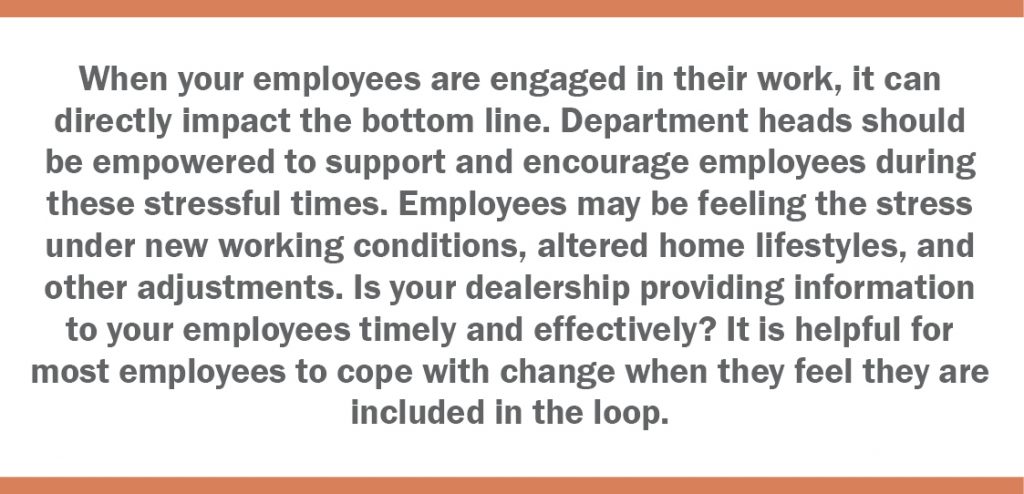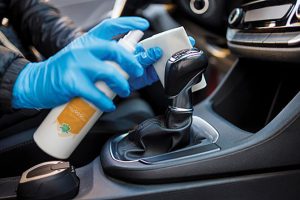By Christine Andrews
In the short time coronavirus has impacted the global economy, cash has become the coveted asset in troubled times. Dealers should continue to develop plans for cash conservation as part of their overall business risk and continuity plan. If you are a typical dealer, you probably check your cash balance daily. Robust cash management buys valuable breathing space. Dealers must take a hard look and find ways to operate lean, save cash, and make cash last longer. Consider these ideas to maximize cash flow during the COVID-19 outbreak and beyond:
- A dealership should review expenses and look for areas where you can save money. As you continue to monitor and strategize, stay focused on identifying additional ways to reduce your cost structure and breakeven point. Take a hard look at which bills need to be paid (and when) and which ones can be deferred, reduced or paid in installments.
- For example, advertising is essential when operating your dealership, but it needs strategic management. If you haven’t done so already, consider reducing the cost of traditional advertising and utilize social media platforms, such as Facebook, Twitter and Instagram. Encourage employees to share posts on their profiles to enhance social media exposure. Always remember to be careful and adhere to state and federal advertising regulations when creating nontraditional social media advertisements.
- Another savings option to consider is replacing traditional desktop computers with laptops. Laptops typically use less energy. This could reduce your monthly energy bill and, at the same time, provide seating flexibility to assist with social distancing concerns.
- Reach out to OEMs and floor plan lenders and see if they will suspend curtailment payments on aged inventory. Some floor plan lenders are deferring interest payments. Consider taking advantage of the ability to defer this large liability.
- Some dealerships may be in an equity position with their inventory and can maximize the utilization of cash by floor planning all new vehicles and allowable used vehicles.
- Apply for an increase of the reimbursement rate for parts or labor paid under warranty. In many states, manufacturers are required to reimburse a dealership for warranty repairs, average labor and parts rate charged to retail customers. Many service departments have the time to print repair orders and make this submission without too much disruption during peak hours. In many cases, the dealership has limited operating hours, and the repair orders can be programmed to print when the service department is closed.
- Wholesale only those aged used vehicles that will not be retailed. The price of used vehicles dropped dramatically when COVID-19 shutdowns began; however, the prices for used vehicles have recently jumped sharply. Because inventory is difficult to acquire at an affordable price, many dealerships are branching outside of their normal shopping radius. Consider exploring different purchasing options.
- Work with lenders and ask for forbearance or payment plans for outstanding loan balances.
- Discuss options with your manufacturer to loosen restrictions on parts and core returns.
- Increase your cash position by reviewing receivables. Work to minimize balances in Contracts In Transit, Accounts Receivable, Incentive Receivables, Finance and Insurance Receivables, and Warranty Claim Receivables. These balances should be reviewed regularly to expedite collection. This may be an ideal time to reevaluate dealership lending practices.
- Reduce personnel expenses by hiring smart and maintaining talent.

When your employees are engaged in their work, it can directly impact the bottom line. Department heads should be empowered to support and encourage employees during these stressful times. Employees may be feeling the stress under new working conditions, altered home lifestyles, and other adjustments. Is your dealership providing information to your employees timely and effectively? It is helpful for most employees to cope with change when they feel they are included in the loop. Ensuring your employees have leadership contact is more important than ever and a crucial tool in stressful times. Leaders should be widely visible and accessible.
In addition to supporting employees, managers should continue to meet regularly to discuss the current state of the dealership. Each department manager should maintain a close pulse on the profitability of their department. In addition to fiduciary responsibility, the department managers must be aligned and able to answer questions that relate to COVID-19 and today’s business environment. Employees will likely have questions and, if exposed to conflicting answers, may become anxious. The COVID-19 pandemic has placed department managers in critical positions. It is up to these leaders to cultivate a positive post-pandemic work environment where employees will thrive.
As employees settle into the new normal, they may develop a false sense of security as it relates to the transmission of COVID-19. Many folks have short memories. Leaders must monitor the behavior of employees and confirm all individuals adhere to CDC guidelines and the restrictions placed on social distancing, mask-wearing and hand-washing. Without proper oversight, both customers and employees may become uncomfortable. Leaders in the dealership must actively engage in compliance to avoid unnecessary consequences.
Hire smart! Experience is important but isn’t everything. Experience comes with additional costs. More and more companies now hire fresh college grads and train them. It may become more cost-effective than hiring an experienced individual when filling some positions. For critical work scenarios, you may have no other option but to consider an experienced hire. When considering fresh talent, not only do you gain a monetary advantage, but you may also benefit from having an enthusiastic employee who is up-to-date on the latest technology, openminded and eager to learn.
The Bottom Line: There will be tough times ahead for dealers across the county. The steps you take now will better position your dealership as this global threat stabilizes. While it’s hard to predict what the future will bring, dealers who plan strategically and take action now will have a better chance of reducing financial setbacks.
Christine Andrews is a consultant at WithumSmith+Brown, PC. Her responsibilities include evaluating and critiquing safeguards and expense controls in dealerships and establishing internal controls that lead to more secure methods for safeguarding dealership assets. She can be reached at candrews@withum.com.
This story appears in Issue 2 2020-21 of the New Jersey Auto Retailer Magazine.







